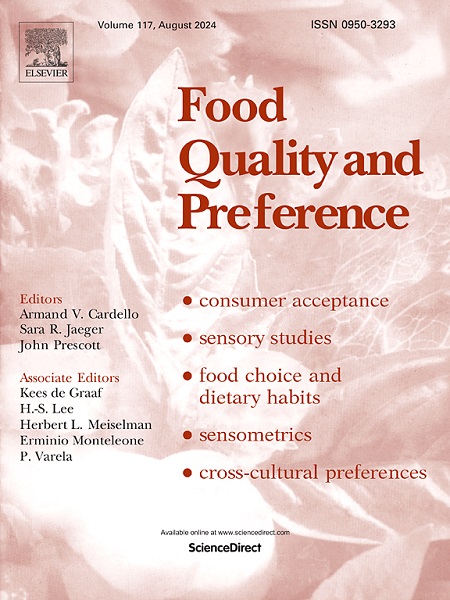Dynamics of sensory and decision-making processes in the evaluation of extra virgin olive oil by a consumer tasting panel
IF 4.9
1区 农林科学
Q1 FOOD SCIENCE & TECHNOLOGY
引用次数: 0
Abstract
This study aimed to assess whether a Signal Detection Theory-based approach could separately evaluate sensory and decision-making processes in untrained consumers replicating expert olive oil tasting conditions. In Experiment 1a, participants compared four unique non-commercial extra virgin olive oils (EVOOs) as “signals” against a commercial EVOO as “noise.” Overall, participants' sensitivity, as evaluated using Grier's A' index, varied depending on oil attributes, with participants being able to distinguish green oils from the commercial EVOO. Meanwhile, decision bias, measured using Donaldson B'D index, remained neutral, indicating that participants' evaluations were not biased in the absence of expectancy manipulations. Experiment 1b used a Double Dissociation Additive Test, manipulating sensory variables (green vs. ripe oils) and decision bias (by adjusting Signal-Noise base rates). Regardless of the induced bias, participants were able to distinguish the green fruity EVOO from the noise, but failed to differentiate the ripe EVOO from the noise. Expectations biases influenced evaluations only for ripe oils, revealing an interaction between sensory and decision-making processes. There were no significant differences in the economic valuation of the different oils in either experiment, indicating a dissonance between participants' declared preferences for the oils and their economic valuation. These findings highlight the value of methods that distinguish sensory from decision-making processes in EVOO tasting studies.
由消费者品尝小组评估特级初榨橄榄油的感官和决策过程的动态
本研究旨在评估基于信号检测理论的方法是否可以在未经训练的消费者复制专家橄榄油品尝条件下分别评估感官和决策过程。在实验1a中,参与者将四种独特的非商业特级初榨橄榄油(EVOO)作为“信号”与商业EVOO作为“噪音”进行比较。总体而言,参与者的敏感度根据油的属性而变化,参与者能够区分绿色油和商业EVOO油。同时,使用Donaldson B - d指数测量的决策偏差保持中性,表明在没有期望操纵的情况下,参与者的评价没有偏差。实验1b使用双重解离添加剂测试,操纵感官变量(绿色与成熟油)和决策偏差(通过调整信噪比)。无论诱导偏差如何,参与者都能够将绿色水果的EVOO与噪音区分开来,但无法将成熟的EVOO与噪音区分开来。期望偏差仅影响成熟油的评价,揭示了感官和决策过程之间的相互作用。在两个实验中,不同油的经济评价没有显著差异,这表明参与者对油的偏好与其经济评价之间存在不一致。这些发现强调了在EVOO品尝研究中区分感官和决策过程的方法的价值。
本文章由计算机程序翻译,如有差异,请以英文原文为准。
求助全文
约1分钟内获得全文
求助全文
来源期刊

Food Quality and Preference
工程技术-食品科技
CiteScore
10.40
自引率
15.10%
发文量
263
审稿时长
38 days
期刊介绍:
Food Quality and Preference is a journal devoted to sensory, consumer and behavioural research in food and non-food products. It publishes original research, critical reviews, and short communications in sensory and consumer science, and sensometrics. In addition, the journal publishes special invited issues on important timely topics and from relevant conferences. These are aimed at bridging the gap between research and application, bringing together authors and readers in consumer and market research, sensory science, sensometrics and sensory evaluation, nutrition and food choice, as well as food research, product development and sensory quality assurance. Submissions to Food Quality and Preference are limited to papers that include some form of human measurement; papers that are limited to physical/chemical measures or the routine application of sensory, consumer or econometric analysis will not be considered unless they specifically make a novel scientific contribution in line with the journal''s coverage as outlined below.
 求助内容:
求助内容: 应助结果提醒方式:
应助结果提醒方式:


